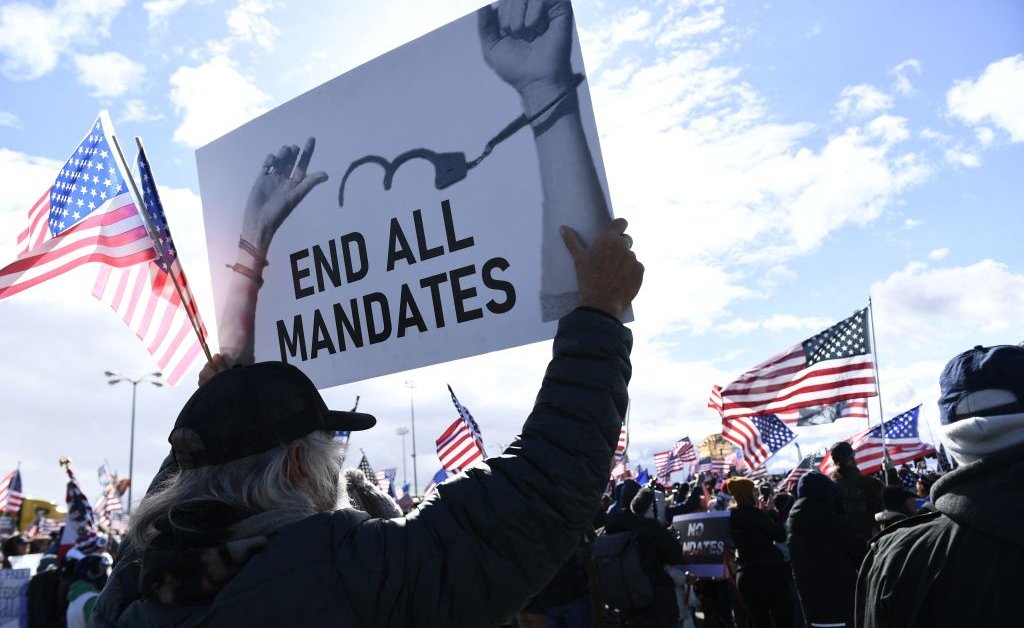This article is part of The D.C. Brief, TIME’s politics newsletter. Sign up here to get stories like this sent to your inbox.
For a brief moment, there seemed to be a lull in the politicization of a plague. Sure, there were still the anti-vaxxers showing up at school board meetings—and sometimes running them—and the occasional kerfuffle over mandates boiled over. Dr. Anthony Fauci remained a despised figure for some, and one cable network in particular made a point of finding every excuse to post his mug on screen. The internet, safe harbor for kooks of all stripes, continued to promote baseless theories about Covid-19’s origins and potential end.
Still, as the spread of the disease and its disinformation seemed to slow from its hateful boil, things started to feel like they were approaching pre-pandemic levels of normal. Sure, there were still some 135,000 new cases on Thursday in the United States, but that’s way off from the million-plus cases seen last January.
This was, to be clear, a good development. Treating every discussion around a global pandemic that has infected more than 650 million people and killed almost 6.7 million as some sort of binary political test was—and is—a maddening approach to a crisis. Yet there are those who are all too happy to view the pandemic as a useful weapon in scoring points, a detour away from responsible conduct and into the circus tent of politics. Screaming as loud as you can doesn’t make your denial of Covid’s threat any less of one.
Like I said, there was a moment when the carnival organ grinded to a stop, notably when the Republican primaries of this year ended. The silence, however, proved short-lived. Its pipes are back screaming, right as the opening days of the 2024 contest appear to have arrived.
Newly crowned Twitter owner Elon Musk last week sent his own rocket of a troll on his new toy: “My pronouns are Prosecute/Fauci.” It was a double-barreled ding against both the nation’s top immunologist, and the inclusive approach of allowing individuals to choose their own gendered or gender-neutral pronouns. Musk, who is testing just how elastic Twitter can be in accommodating political stances, drew the predictable outrage and reward—a cycle some politicians already know well.
Then there was the recent decision by Congress, or more specifically Senate Democrats, to trade away a mandate on vaccines for U.S. military members in exchange for the must-pass defense bill. Even though Defense Secretary Lloyd Austin supported the mandates, it was just one of those things that fell aside in the chase for the big-picture spending. (A companion effort to reinstate discharged service members, however, did not get support.) Defending the Biden administration’s mandate was unlikely to win Democrats many friends, especially when it meant potentially sacrificing a pay raise for the troops. There are no wins in denying men and women serving in uniform their due, especially at the holidays.
Cynicism, however, always wins. Consider Gov. Ron DeSantis, for example. Just over a year ago, the leader of the aging state of Florida leaned heavily into vaccines. He urged his residents to get the jab, praised vaccines for saving lives, and scrambled to understand the impact of a pandemic on a state with a heavy reliance on tourism. But then, he looked around at the political landscape facing his 2022 re-election and potential 2024 presidential bid, and pulled a full 180: he banned mask and vaccine mandates, trashed Fauci at every turn he could find, and wouldn’t even say if he got his booster shot. He barreled ahead with plans to reopen Florida before the pandemic had even hit its nadir. Last week, while convening anti-vaxxers for a chat—and preparing for his next act in politics—DeSantis suggested his state’s supreme court should impanel a grand jury to investigate pharmaceutical companies’ transparency in vaccines.
The ultimate practitioner of such savvy amplification of Covid-19’s political juice remains former—and perhaps future—President Donald Trump. His return to power hinges on DeSantis’ potential to chase and catch him. After all, it was only a year ago that Trump drew boos when he told an otherwise friendly crowd that he had received his vaccine booster. And to the chagrin of much of his base, he never fired Fauci (even though he couldn’t really do it). Trump is, for the true anti-vaxxers, an unreliable partner when it comes to fighting the Establishment’s faith in science.
Both men’s supporters are looking at their positions on vaccines as an early barometer for success. For Trump, his role in developing Operation Warp Speed is seen as evidence that he helped beat back the virus’ hellscape—even though he wrongly says the vaccine rollout was delayed until after the election for political hackery. For DeSantis, his steady evolution into an anti-vaxxer—or at least someone who seems palatable for true anti-vaxxers—is a way to creep onto turf long assumed to be safely in the MAGA column. So, even as Covid’s threat seems to be fading, it is surely going to have VIP access to the coming GOP primary calendars.
The contest, however, may end up coming down to who has the louder megaphone, and Covid amounts to an easy primal scream. The decibel-level-as-proxy-for-fact strategy is one that seldom serves voters well and often drives the conversation into a ditch of regret. This sort of performative protest is nothing new, and it can read as tired after a while.
There are real costs to this conduct, though. Red states have borne the brunt of Covid-19, with states that backed Trump posting the absolute lowest rates of immunization. Being a “vaccine skeptic,” as some prefer to be known, is fashionable in some circles. That status, new research tells us, can also be deadly: the redder a locale, the more likely it was a high-mortality place for Covid-19 and other ailments. Judging by how some thought leaders are positioning themselves, it’s a point of pride to keep hospitals and funeral homes alike packed with avoidable troubles. And some of the biggest self-described proponents of besting science with trolling are preparing their next shouts. The quiet, it seems, is over.
Make sense of what matters in Washington. Sign up for the D.C. Brief newsletter.
More Must-Reads From TIME



